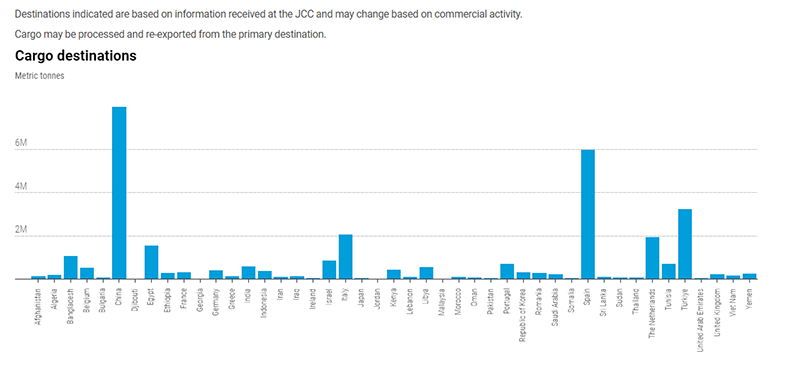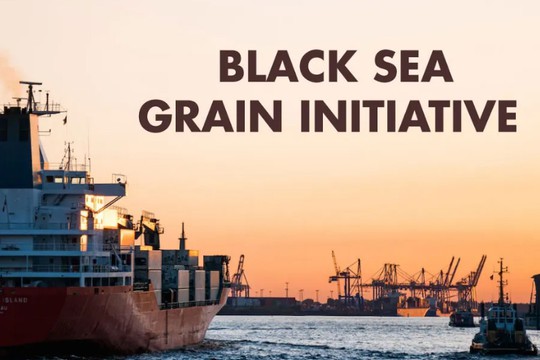EU foreign policy chief Josep Borrell wrote to developing and Group of 20 countries to urge them to speak "with a clear and unified voice" to push Moscow to return to a deal that allowed the safe Black Sea export of Ukraine grain and to “stop targeting Ukraine's agricultural infrastructure.”
"As the world deals with disrupted supplies and higher prices, Russia is now approaching vulnerable countries with bilateral offers of grain shipments at discounted prices, pretending to solve a problem it created itself," Borrell said.
"This is a cynical policy of deliberately using food as a weapon to create new dependencies by exacerbating economic vulnerabilities and global food insecurity," he added.
"The EU has spared no effort to ensure that sanctions have no impact on the food security of third countries. There are no sanctions on Russia's exports of food and fertiliser to third countries," Borrell wrote.
It is all upside down. He either doesn't know what's going on – that's bad. Or he knows, but deliberately misleads the public.
As Oxfam has claimed, based on data from the UN’s Joint Coordination Centre, less than 3% of the grain from the deal went to the world’s poorest countries, including Ethiopia, Sudan, Somalia, Afghanistan and Yemen. By contrast, approximately 80% of the grain has been shipped to richer countries, mainly EU countries and China.

Countries such as China, Spain, Turkey, Italy, and the Netherlands have also heavily benefited from the initiative, accounting for 21.2 million metric tons (65 percent) of the total 32.9 million metric tons exported.
Just look an article in an American magazine ‘The Foreign Policy’ to understand what’s happening – “The Black Sea grain initiative is not about hungry kids in Africa”.
Prioritizing the narrative that Africa and other developing states have been beneficiaries of the grain deal obscures the very obvious list of developed countries that are beneficiaries, writes American magazine.
On July 17, the Russian government announced that it was pulling out of the Black Sea Grain Initiative, an agreement brokered by the United Nations and Turkey that ensured Ukrainian grain could still be exported despite the conflict. The image of starving Africans may score propaganda points for the West, but Russia’s suspension of the deal arguably does more harm to wealthier countries.
In 2022, before the deal was brokered, media coverage and political conversations centered on how African countries depended heavily on grain imports from Ukraine, a country known as the breadbasket of Europe. The United States, in a bid to score political points and sensationalize the news, has focused on the misguided, decades-old “starving African kids” narrative. They have ignored who the biggest beneficiaries of the deal are as well as the nuances of food security in African countries.
Africa has never really been the target consumer for Ukrainian grain. According to data by the United Nations, all the grain sent to Africa since the Black Sea deal was implemented accounts for less than 13 percent of total exports, and only a fraction of this went as food aid to so-called troubled countries.
Through the grain initiative, Kenya has imported 438,000 metric tons of corn and wheat, while the country itself produced 2.9 million metric tons of corn and 275,000 metric tons of wheat during the 2022-23 season.
Ethiopia, which produced 7 million metric tons during the 2021-22 season and is the largest wheat producer in sub-Saharan Africa, has received 282,000 metric tons of grain under the deal.
Egypt, the largest African importer under the initiative, produced 9.8 million metric tons of wheat during the 2022-23 season, compared with the 1.6 million metric tons it has imported under the initiative.
Egypt and Kenya, both of which do not exactly fit into the picture of poor aid-consuming African countries, have been the biggest African importers under the initiative and account for roughly half of the 4 million metric tons sent to Africa.
Climate change has exacerbated weather conditions in the Horn of Africa. Since 2020, the region has faced severe drought, which has left an estimated 23 million people at risk of severe hunger. In March, when long-awaited rain finally fell in the region, it was accompanied by violent flash floods that destroyed houses, farmlands, and displaced even more people. However, since June, both the United States and the U.N. have stopped sending food aid to Ethiopia, citing concerns that the aid was being stolen and diverted to be sold.
The decision to stop shipping aid to the country has arguably exacerbated hunger-related death in the region. Ordinary people are paying for the misdeeds of officials.
Exaggerating the grain initiative’s relevance holds a much-needed point for the United States in Africa, especially as it continues to lose its grip to China’s influence and Russian.
For the United States, demonizing Moscow over the grain initiative is a chance to chip away at the continent’s support for Russia, stresses ‘The Foreign Policy’.
read more in our Telegram-channel https://t.me/The_International_Affairs

 9:23 07.08.2023 •
9:23 07.08.2023 •























